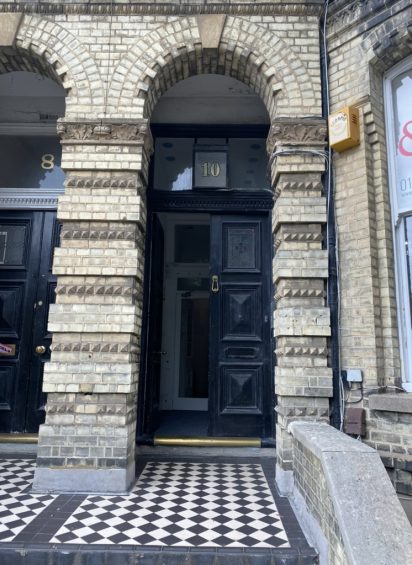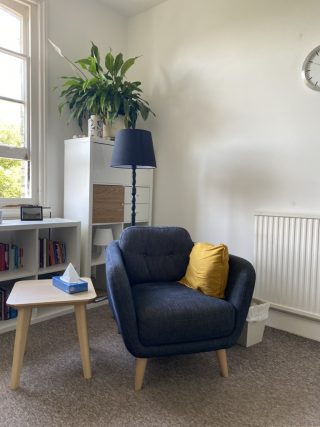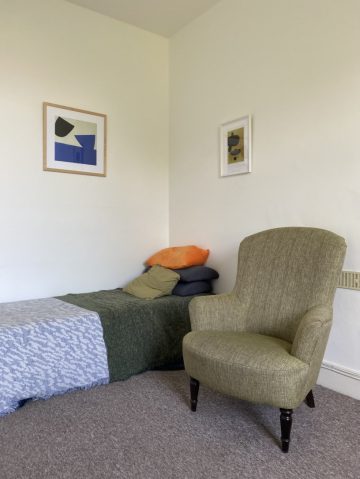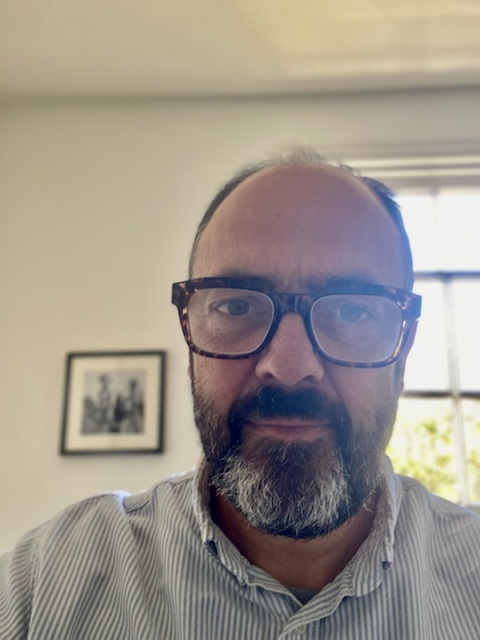About Me
I have been working as a Psychodynamic Psychotherapist since 2010, working with adults and adolescents.
I have worked as a psychotherapist in a range of professional contexts, supporting different groups of people with stress, anxiety, depression, trauma and other emotional and mental health difficulties .These have included;- parents with young children at Sure start Children’s centres, students at Sussex University, families and adolescents at the Youth Offending Service and at Brighton council providing individual Psychotherapy and counselling to young people aged 16-25 in supported accommodation.
In private practice, I have worked for Brighton and Hove Psychotherapy and Brighton Therapy Centre which I have been at since 2012. Since 2022 I have also worked privately from my own consulting room in The Drive in Hove. I am part of the Brighton Psychotherapy and counselling collective, which is small group of psychoanalytically informed Psychotherapists with an interest in contemporary psychoanalysis.
Within this range of experience, I have worked with individuals experiencing a wide range of emotional and psychological difficulties and distress including: - anxiety and depression, stress, trauma, loss, relationship difficulties and breakdown, work stress, addictions, histories of neglect and/or abuse, self-harm and people who have suffered from breakdowns and experienced more severe depressions and experiences of psychosis. I also have experience working with neurodiversity including autism and ADHD.
I have taught for Brighton University on both its introduction to counselling course and its MSc in Psychotherapy and have delivered training for housing support staff in, working psychologically, and working with Personality disorders, for Brighton council since 2012.
2023-Supervision Qualification. Society of Analytic Psychology. 2023.
2016-Functional Family Therapy qualification– Youth Offending Service.
2010-2014 MSc in Psychotherapy. University Of Brighton 2014.
2008-2009 Integrative Counselling with a Mindfulness based approach through The Centre for Mindfulness Based Education. 2009.
2004 -2008-participant and facilitator of men’s rites of passage, groupwork and psychodrama.
I regularly attend Continuing Professional development events and have undertaken further training in working with adolescents, neurodiversity, sexuality and identity.
I have been registered with UKCP (UK Council for Psychotherapy) since 2014 (2011164259) and am bound by their code of ethics. I am also fully DBS cleared due to my work with young people and vulnerable adults for Brighton council.
How I Work
My therapeutic approach is Psychodynamic, and this means that I will listen closely to the experiences you tell me about and try to think carefully with you about how these are affecting you and how you are responding to them both consciously and unconsciously. For more information see my page on Psychodynamic Psychotherapy.
Initial meeting
You are welcome to contact me via this form, and we can arrange an initial phone conversation where I can understand a little about your difficulties and answer any questions you may have. Then we may arrange an initial consultation where we can meet for 50 minutes and go into this in more depth and talk about how we might work together. We can see if my approach may be helpful for you and think about ongoing meetings. I offer in person and online sessions.
What is Psychodynamic Psychotherapy
Psychodynamic Psychotherapy has much in common with most therapeutic modalities, in that it privileges the creation of a confidential, compassionate and understanding listening. The main theoretical difference with other modalities is the concept of the unconscious. This means, that it takes the position that not everything we do is through conscious awareness. We are affected by our past and present experiences and these shape and filter how we react to the world in ways that are not always straightforward or apparent.
Often, core experiences and beliefs are ‘unconscious but operational’, driving us in ways that aren’t understood yet have influence upon us. Understanding these at an emotional level helps alter their influence.
This happens through us working together; - for you, to share, as openly as possible your experiences, thoughts, dreams and emotions, and for me; -to listen carefully and use my mind and experience to reflect with you on these, offering, support, challenge and another perspective. It is by understanding these deeper levels of our experiences and how they link with our behaviour that we can gain awareness of ourselves and create space and choice to review and alter ingrained and unhelpful ways of being.

It is important to understand that these ways of being have often been helpful, perhaps even essential at some point and in understanding this we can find ways to be compassionate and uncritical but also challenging of what may no longer be helpful.
My training has included learning about different theories of mind and mental distress and has involved personal experiences of training therapy where I have come to understand at a personal level my own processes, defences and how my experiences have shaped me. This is an important part of training as a psychotherapist as it involves understanding ourselves and our own dynamics a fundamental pre-requisite in being able to help others.
Psychodynamic Psychotherapy is an evidence based treatment for a wide range of emotional and mental difficulties, including anxiety, depression, trauma and loss and the symptoms, of these, including, OCD, addictions, trouble with motivation, low self-confidence and esteem, difficulty in maintain relationships and general problems related to love and work.
Areas I Can Help With
Please click on any heading for further information.
Anxiety is often caused by both external and internal difficulties, a challenging life situation, feelings of loss, abandonment, rejection and being misunderstood. These can create painful internal turmoil, worry and intense physical symptoms. The provision of another calm and containing mind can help to bring back a sense of balance.
Depression is often made up of feelings, of sadness, despair, hopelessness and worry. These can cause irritability and instability. A safe confidential space where these feelings can be both experienced and understood, rather than fought against is key to finding a way through and out of this common but painful and sometimes debilitation condition.
Sometimes we can find ourselves repeating self-destructive behaviours that are getting in the way of living well. This can be a painful experience and is often defended against, as it can be felt as a terrible blow to our self-esteem and the idea of who we think we are. Therapy can be a safe place to investigate these.
A key feature of our shared humanity is the desire to relate. Loneliness, sexual desire, and the need to feel accepted and wanted drive our want to be in intimate relationships. Indeed, relationships can be deeply satisfying if to some extent, complex. Through our experiences we can seek intimacy whilst also defending against it or finding ourselves repeating destructive patterns of relating. Through the therapeutic relationship we can safely explore these patterns, bringing them to awareness and finding ways to let go of the pain behind them. In addition, the therapeutic relationship can be a safe place in which to explore and integrate new, more helpful and satisfying ways of relating.
We numb ourselves for all sorts of reasons, but this brings only temporary relief. Often, we attach to something that, although harmful, is at least reliable and effective. Therapy for addictions can be complex as it can get in the way of insight and progress. However, if there is a real willingness to go beyond the numbing behaviour, it can really help to understand what the nature of the pain is that is being numbed. Other treatments may need to be considered alongside therapy if the addiction is severe.
This can be brought about by unexpected changes and challenges. Burn-out, heartbreak, retirement, abuse, loss and identity crisis. These require a thoughtful non-judgmental space where these unexpected challenges to our sense of self can be processed and new ways of being created.
Experiences of trauma, abuse, and/or neglect can be overwhelming and damaging. These experiences have been ‘too much’ to process and instead have been boxed away. At the time this may of been absolutely necessary for psychic survival, but can create problems down the line. The mutual creation of a safe therapeutic can create a space where these experiences be thought about, and processed slowly ‘unboxing’, these painful sometimes unconsciously stored experiences. Trauma can be big T trauma, where there have been significant events tor experiences that have been disturbing and overwhelming or little T trauma, where cumulative experiences of neglect or unavailability have built up and had a profound effect.
Often we know we need to make changes but remain stuck in old patterns. These old ways need to be understood, as well as the imagining and implementation of new ways and paths forward.
Sometimes we just need the supportive space of an hour a week to unburden ourselves to meet the challenges of our lives. Work, relationships, friendships, parenting, and family dilemmas can all be helped by the calm thinking space of therapy, enabling us to bear the burden of our own responsibilities.
Finding out who we are, our true voice when we are often crowded out by so many competing ideas or influences can be essential in living a life of authenticity.
Therapists are required to have their own therapy to experience being a patient. This inevitably illuminates the therapist’s own complexes in this difficult work. As is often stated, we can only take out patients/clients as far as we have gone ourselves
I am a qualified Supervisor qualifying through The Society of Analytic Psychology, which is a Jungian orientated training institute. This has informed my Psychodynamic thinking and my main approach to Supervision is to explore the experience of both therapist and patient as they create the treatment together.
Adolescents 16-25
I have been evolving my work as a Psychotherapist with Adolescents for some time now. I started working with adolescents as a youth worker over 30 years ago and have continued in my Psychotherapy career, through working with Students at Sussex University, setting up a rites of passage mentoring service in Brighton;- abandofbrothers.org, completing a secondment with the Family Therapy Service at the Youth Offending Service and for the last ten plus years have been providing open ended psychotherapy to young people in crisis for Brighton Council. I have completed some of the Society of Analytic Psychologies excellent course on working with Adolescents as a transition and a pathway to adulthood.
Adolescence has always been a difficult time, with the often-precocious rush to an imagined adult identity. Today adolescence can be an almost permanent state of being, with confusion around responsibility and vagueness about the transition to adulthood. Adolescent states of mind and behaviours can continue well into adulthood.

In my work with the Family Offending service, I encountered up close how even with the most supportive family environment, adolescence can throw up huge and sometime quite dangerous challenges. The needs of the parental family and the needs of the adolescence can often be in sharp conflict. Building an initial working relationship is key and presents different challenges to the adult population who come with a greater sense of their own needs. Then there is an agreed focus of the work and the exploration of the adolescent’s identity, dependency conflicts and challenges, providing a neutral space where these can be thought about in some depth. Finally, I aim to support in developing a path through and out of adolescence towards adulthood.

FAQs, room and fees
Initially we may speak by phone or via email and can arrange an initial consultation. In this initial meeting I will invite you to tell me about what is going on for you and seek to get a general understanding of you and your history. It is also a chance for us to meet, for you to get sense of me and to see if we would be a good ‘fit’. We may agree to work together and or to have another preliminary meeting or we may think about other approaches that may beneficial. There is no commitment to continue from this meeting.
If we agree to commence therapy, we will agree a day and time to meet weekly, either once a week or twice a week. We may agree to work for a set amount of time, a few months or work more openly deciding as we go what is most beneficial.
I do charge for missed sessions as that time will have been put aside exclusively for your use, however of possible I will try and offer an alternative time in the same week. Obviously, I don’t charge if I am away.
My standard fee is £75 although I do offer some lower cost places for those on low incomes. I do charge for initial consultations.
I work from my own private consulting room in The Drive in Hove.




